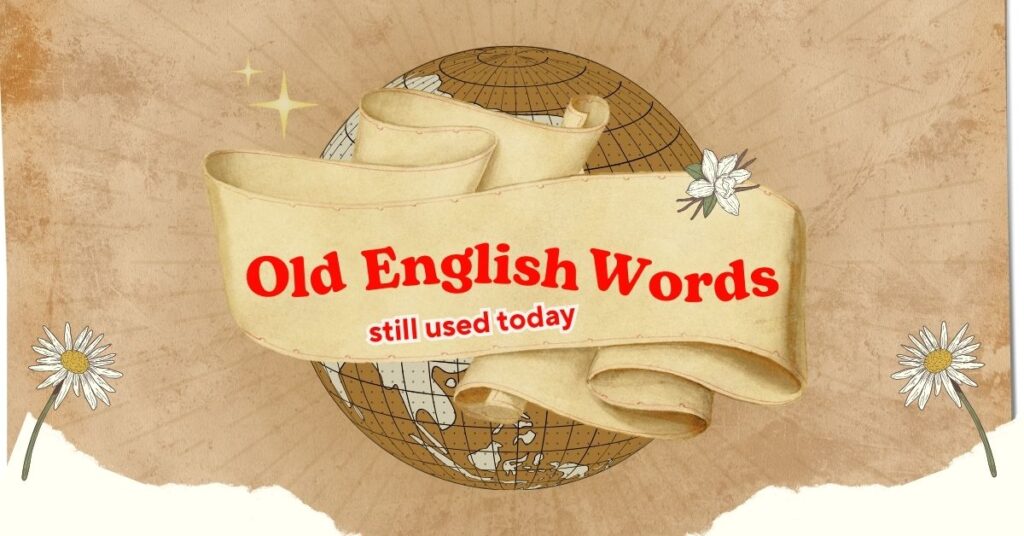Old English Words Still Used Today: Did you know that some of the words we use every day are over a thousand years old? It’s true! Many words from Old English are still part of our language today, and they’re just as useful now as they were back then.
In this lesson, you’ll explore 82 Old English words that you already know and use—words like home, friend, sun, and love. These words have simple meanings and are easy to understand, but they also carry a piece of history with them.
So, are you ready to learn more about the words you use every day? Let’s take a fun trip back in time and discover how the past lives in our language!
82 Old English Words Still Used Today

Everyday Words (Nouns)
- Bread – Originally meant “a piece or morsel of food,” now refers specifically to baked goods.
- Home – A place where one lives; retains its original meaning.
- Earth – The ground or planet; still used as in Old English.
- Friend – Someone with whom one shares a bond of mutual affection.
- Love – An intense feeling of affection; unchanged in meaning.
- Hand – The body part; its usage has remained consistent.
- Night – The period of darkness between sunset and sunrise.
- Star – A celestial body; retains its meaning.
- Water – The liquid essential for life.
- Sun – The star at the center of our solar system.
- Man – A human being or adult male.
- Woman – An adult female.
- Child – A young human.
- House – A building for living.
- Field – Open land used for farming or as pasture.
- Stone – A hard, solid mineral material.
- King – A male ruler of a kingdom.
- Queen – A female ruler or the wife of a king.
- World – The earth and its inhabitants.
- Bridge – A structure spanning a river or gap.
Animals:
- Fish – Aquatic animals; still widely used.
- Hound – A type of dog; the word survives, though “dog” is more common.
- Wolf – The wild canine animal; its meaning remains unchanged.
- Horse – A domesticated animal used for riding.
- Sheep – A wool-producing animal.
- Cow – A domesticated animal raised for milk or meat.
- Mouse – A small rodent.
- Bees – Insects known for producing honey.
Also Read: 20 Old English Words No Longer Used
Nature and Elements
- Swan – A type of waterfowl.
- Tree – A large plant with a trunk and branches.
- Fire – Combustion producing heat and light.
- Rain – Water falling from the sky.
- Cloud – A visible mass of water vapor in the sky.
- Wind – Moving air.
- Hill – A naturally raised area of land.
- Snow – Frozen precipitation.
- Lake – A large body of water surrounded by land.
- Grass – Green plants forming a lawn or pasture.
- Heaven – The sky, or a spiritual realm.
- Moon – Earth’s natural satellite.
Everyday Actions (Verbs)
- Sing – To produce musical sounds with the voice.
- Give – To transfer something to another person.
- Help – To assist or aid someone.
- Come – To move or travel toward a place.
- Go – To move from one place to another.
- Eat – To consume food.
- Drink – To consume liquid.
- Run – To move quickly on foot.
- Sleep – To rest with eyes closed.
- See – To perceive with the eyes.
- Hear – To perceive sound.
- Speak – To express thoughts verbally.
- Think – To use the mind to form ideas.
- Make – To create or build something.
- Work – To perform a task or job.
Basic Concepts
- Good – Morally right or beneficial.
- Strong – Having great physical power or strength.
- Hard – Firm or solid.
- Cold – Of low temperature.
- Red – A primary color; still used for the same hue.
Adjectives and Adverbs:
- Big – Of considerable size or extent.
- Little – Small in size.
- Bright – Giving off lots of light.
- Dark – Lacking light.
- Fast – Moving quickly.
- Slow – Moving at a low speed.
- Hot – Having a high temperature.
- Old – Having existed for a long time.
- Young – Having lived for a short time.
- High – At a great height.
Also Read: 81 Old English Words to Enrich Your Vocabulary
Pronouns and Prepositions
Here are the answers with digits from 71 to 77, keeping the bold formatting:
- I – Referring to oneself.
- You – Addressing another person.
- We – Referring to a group including oneself.
- In – Inside something.
- On – Resting atop something.
- Under – Beneath something.
- Over – Above something.
Time Words:
- Day – A 24-hour period.
- Night – The time between sunset and sunrise.
- Year – A period of 12 months.
- Morning – The early part of the day.
- Evening – The latter part of the day.